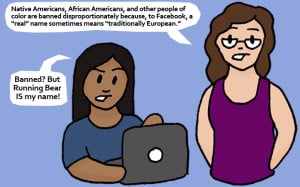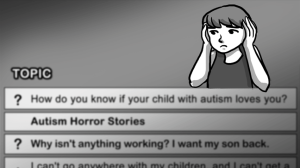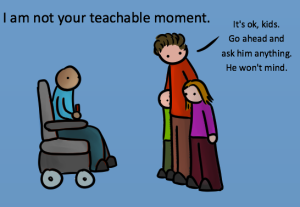I could’ve sworn I told him I was working late.
But my then-boyfriend was screaming at me, saying I was lying about where I’d been, and accusing me of cheating on him.
He insisted that if I really cared about him, I would’ve stayed in constant contact instead of making him wonder where I was.
“This is why I can’t trust you!” he said.
I thought maybe he was right. Maybe it was my fault he was so overprotective and insecure about our relationship.
Maybe if I’d made sure he knew I was working late, if I’d called from work just to prove it, he wouldn’t have to worry about whether or not I was lying.
But still. I could’ve sworn I told him ahead of time that I’d be working late. Was I just imagining that whole conversation?
Being uncertain about your own perception of reality is a terrifying feeling.
It seems like nothing you once relied on to understand the world around you – your memory, your sensory experiences, your intuition – is as trustworthy as you once thought.
And it was this disconcerting state of being that was once my constant reality – not only when I was in a tumultuous relationship with my abusive ex-boyfriend, but for a long time after that relationship ended.
Several years later, I still sometimes have a hard time trusting my perceptions. But at least now, I understand why: My abusive ex was gaslighting me, and that’s no easy thing to recover from.
Gaslighting refers to when someone tries – intentionally or not – to overwrite your memories or perceptions. Lots of people have experienced this form of emotional abuse, and many of them don’t even know it.
Gaslighting can look like a partner saying, “You’re exaggerating – that never happened” when you mention a way that they’ve hurt you.
It can be a parent telling you that you’re “oversensitive” your whole life, shutting down your understandably emotional reactions to situations that were hard to deal with as a child.
It can even happen in the context of social justice, with people saying you’re “making a big deal out of nothing” because you’re upset about sexism, racism, and other forms of injustice.
And if you’ve been the victim of gaslighting, but you have no idea how the hell to begin healing from it, you’re not the only one.
A common result of gaslighting is questioning everything. You may feel like you’re going “crazy.” Like you don’t know what’s real and what’s imagined. Like you can’t even make the simplest choices, because you find it impossible to know what’s “right” and what’s “wrong.”
You may feel like you’ve lost your sense of self – like you need someone else to confirm that your perception is correct before you trust that anything you believe is true.
This burden is a terrible one to carry, and you deserve to be free from it so you can trust yourself again. Learning about the nature of abuse is a great place to start with healing, so I’m glad you’re taking the time to read resources like this one.
My personal healing journey has brought many surprises. I wish I could tell you I’ve found a clear path to recovering from trauma and that life has been dandy since then – but that’s not really how trauma works.
I’ve had many ups and downs, and pulling myself out of the dizzying effects of gaslighting has been one of the most difficult parts.
But one of the surprises that gave me the most hope is the realization that I’ve got more tools for recovering my sense of reality than I ever imagined.
I’ve also worked with many other survivors, so I know for a fact that I’m not the only one with these tools. You have the ability to move toward healing, too.
I’d like to share some of the unexpected things that have helped me recover my truth, my reality, and my trust in myself.
I hope you find some of these ideas useful as you heal from the painful impact of gaslighting. And I hope you can connect with your own wisdom that has already helped you survive – and will continue to help you find the safety and happiness you deserve.
1. Allowing Myself to Make Mistakes
Making mistakes was one of the last things I wanted to do after I left my abusive ex.
All I could think was that my own mistakes got me in that terrifying situation in the first place. And I still had my ex’s words ringing in my head – every time he told me it was my own fault when he hurt me, or that I was a failure who couldn’t do anything right.
This is exactly how gaslighting erodes your trust in yourself. When you’re constantly hearing that you’re doing something wrong, it’s only natural to begin to question whether you can do anything right.
Immediately after our relationship ended, I was sure that the only way to recover from this was to be absolutely sure that everything I did was the “right” thing to do.
Except that we all make mistakes, so of course I couldn’t do everything “right.”
Over time, I realized my self-imposed pressure to be perfect was actually a lingering effect of trauma.
And making mistakes was far from a sign that something was “wrong” with me – it was simply a sign that I’m human.
In spite of what your abuser may have told you, making mistakes doesn’t mean you’re a “bad” or “worthless” person. Give yourself permission to make and learn from mistakes, just like the rest of us.
2. Making My Own Choices
That pressure to be perfect had me convinced that I’m terrible at making decisions.
So, for a while, I was pretty indecisive, which was fine – but I was indecisive because I thought I didn’t know what was right or wrong.
When I was with my ex, every choice I made was under scrutiny – and every single one could later be twisted to blame me for something that went wrong.
He’d say he blew up at me in public because I “made” him go out, denying that going out was his idea in the first place. He’d get mad at me for “changing my mind” by saying no to sex, even though I hadn’t said yes to begin with.
Trying to make decisions after being treated like that feels impossible. I wondered if I really did have terrible decision-making skills, or an unreliable memory that made me unsure of what I really wanted.
So, as it turns out, a surprisingly simple way to start recovering was finding affirmation in the choices I make for myself.
I’m talking every little choice, from what to eat to when to go to bed. Big choices still felt intimidating for a while, but the more I took the time to celebrate the little things, the more I felt capable of making more significant decisions.
You can start small, recognizing that by making everyday choices, you’re trusting yourself in a way you were never allowed to do when you were being gaslit.
Rather than focusing on whether your choices are “right” or “wrong,” try trusting that your intuition – the protective wisdom you already have within you – will help you figure out what’s best for you.
3. Letting Go of Trying to Make Sense of ‘What Really Happened’
I have scattered memories of the time in my life when I was being abused. Events seem out of order, and there are still times when I question myself about whether things really happened as I remember them.
Between not wanting to relive the traumatic moments and having my ex later claim that he wasn’t as violent as I remembered, it makes sense that I don’t feel a strong grasp of all the details.
Being unable to remember what happened is also a response to trauma that’s normal, common – and perfectly okay.
Recalling and recognizing the terrible things I’ve been through is part of my healing process. For instance, talking to a therapist who validates my traumatized feelings has been immensely helpful.
But sometimes I still feel like something’s “wrong” with me because I can’t place all the details in the right places.
In those moments, it helps to remind myself that my ex’s emotional manipulation actually overwrote my own perceptions.
My ex’s gaslighting had me constantly wondering why things didn’t seem to “add up.”
So nothing’s wrong with you or me if we’re still relearning how to trust our own perceptions to inform our memories. We can take this one step at a time.
4. Crying at the Drop of a Hat – And Releasing Other Seemingly ‘Irrational’ Emotions
Overreacting. Reading too much into things. Being overemotional.
It didn’t matter how badly my ex was treating me – threatening my life, physically attacking me, calling me degrading names – he’d still say my reactions were “blowing things out of proportion.”
These were times when reality didn’t add up. My body knew I was in danger, but my mind was trying to make sense of being told I shouldn’t be so scared, or sad, or angry.
So after a while, the main thing I was feeling was numb. Trying to shut down my feelings was one way to protect myself from the hurtful accusation of “overreacting.”
Now that I don’t have to protect myself from his attacks anymore, I sometimes have to remind myself that it’s safe to feel what I’m feeling.
Whether I’m anxious because of a trigger or tearing up at a sweet commercial, it’s only natural for things to affect me.
Emotions can be scary. And after being gaslit, you might feel ashamed of your emotions.
Getting angry or sad or fearful in response to mistreatment or injustice makes perfect sense. You have every right to express your emotions in a healthy way.
And allowing yourself to feel what you really feel – instead of burying your emotions under shame – can be profoundly healing. You can be honest with yourself about what you’ve been through, how it affects you, and what you need.
You deserve to get your needs met – and your emotions will help you get there.
5. Seeing the Positive in My Vulnerabilities
When I’m trying to make sense of being abused, it’s easy to turn to self-blame.
I used to think that caring about someone who treated me so badly meant that I “let” the abuse happen. I believed I shouldn’t have been such a “pushover.”
Now I know that being abused wasn’t at all my fault – it’s never the survivor’s fault.
Partly because, if nothing else, intimate partner violence is a pattern of power and control that’s a lot more complicated than simply “letting” abuse happen.
And also because the qualities that society associates with being a “pushover” are, frankly, bullshit.
Our culture sets up a false dichotomy between being “strong” and being a victim of violence. People oversimplify the nature of abuse when they say things like “I’d never let a partner hit me.”
For me, internalizing these messages looked like doubting that my partner’s emotional abuse, such as gaslighting, really counted as part of the violence.
I also saw some of my personality traits as flaws that made me vulnerable to violence. For instance, people have always described me as “nice,” so I thought I’d been “too nice” and let someone walk all over me.
But these same qualities are also related to empathy, and compassion, and the tendency to look out for others. I’m standing up for myself by seeing the good in these things, rather than shaming myself for what society might say “made me” a victim.
If you’re in the self-blaming cycle of believing you deserved to be abused because of something “wrong” with you, I hope you can take a moment to appreciate yourself instead.
There’s nothing about you that has made abuse your fault. But you have plenty of admirable qualities that have helped you survive.
Reframing your thinking to see your vulnerability as strength, rather than weakness, can help you escape the cycle of self-blame and move through a cycle of healing.
Instead of believing your vulnerabilities put you in a position to be abused, think of it this way: Someone took advantage of your positive qualities, which is not your fault. But those same qualities helped you get through it to be the powerful survivor you are today.
6. Facing the Possibility That Gaslighting Could Show Up Again in Other Forms
I know – this one’s pretty disconcerting. Gaslighting is a terrible experience, and if there was one thing I wanted to run from after escaping my abusive ex, it was the possibility of ever going through something like that again.
I’m not saying we’re all going to have to relive anything like our worst experiences with gaslighting.
But now that I know what gaslighting is, I realize it can show up in a variety of ways – even in our everyday cultural norms that we don’t think of as abusive.
For instance, heavy emotions and ugly truths can be difficult to deal with. So even when we’re trying to support each other, we can overwrite other people’s realities.
“Don’t cry – everything happens for a reason.”
“You shouldn’t let it get to you. Just think positive!”
“Oh, that person didn’t mean to be sexist or racist or transphobic. Don’t take it so seriously.”
Has anyone ever said these things to you? Sometimes, it feels like everyone expects us to completely cut ourselves off from our natural emotions and look away from the truth.
Which makes it all the more difficult to reclaim your emotions and reality.
Although this is frustrating, recognizing that it’s happening actually helps me deal with it. I know emotions can be uncomfortable, and it’s tempting to try to replace uncomfortable feelings with positive ones when you want someone to feel better.
But I know my healing journey must include getting real about what I’m feeling.
So, rather than setting an unrealistic end goal of being “healed” by being happy all the time, try thinking of recovering from gaslighting as an ongoing process.
Embrace your truth and the emotions that naturally come with it – even the emotions other people think are “negative.”
Doing so doesn’t make me weak or oversensitive. It means I’m trusting myself in a way I once thought was impossible.
***
Because healing is an ongoing process, it’s important to take your time. You know what’s best for yourself, so honor your own unique pace and path.
The lessons I’ve shared here took time for me to learn, and I still struggle with them every day.
Perhaps most importantly, I’ve learned that the opposite of being gaslit is trusting my intuition. If something doesn’t feel right to me, I no longer jump to the conclusion that I must be wrong.
As you reconnect with your intuition, be open to the surprises you might stumble upon. You’ve got a hell of a lot more wisdom and strength than your gaslighter ever gave you credit for.
That’s a reality you can be sure to count on.
[do_widget id=’text-101′]
Maisha Z. Johnson is the Digital Content Associate and Staff Writer of Everyday Feminism. You can find her writing at the intersections and shamelessly indulging in her obsession with pop culture around the web. Maisha’s past work includes Community United Against Violence (CUAV), the nation’s oldest LGBTQ anti-violence organization, and Fired Up!, a program of California Coalition for Women Prisoners. Through her own project, Inkblot Arts, Maisha taps into the creative arts and digital media to amplify the voices of those often silenced. Like her on Facebook or follow her on Twitter @mzjwords.
Search our 3000+ articles!
Read our articles about:
Our online racial justice training
Used by hundreds of universities, non-profits, and businesses.
Click to learn more





















